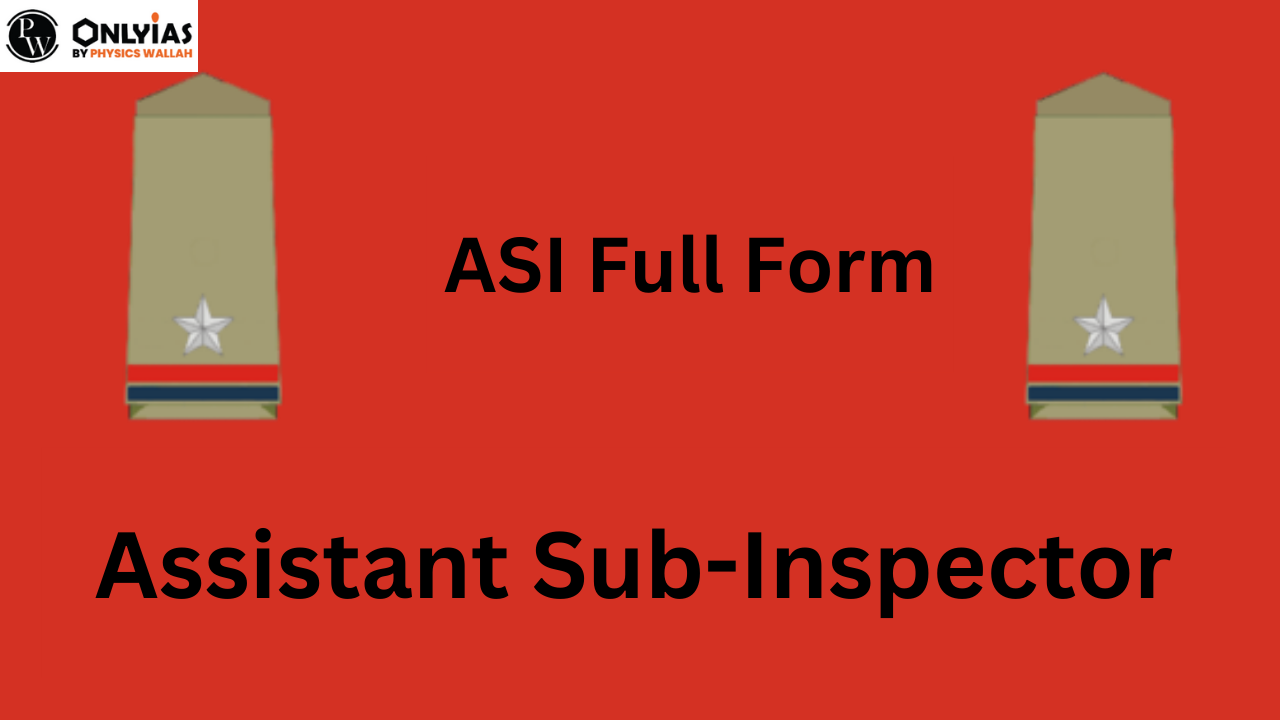ASI full form is Assistant Sub-Inspector. (ASI) role in the police force, its eligibility criteria, recruitment process, and duties. Understand the ASI's vital role in law enforcement and career opportunities in this field.

An Assistant Sub-Inspector of Police (ASI) is a rank in the police force in many countries, including India. The specific roles and responsibilities of an ASI may vary depending on the country and the particular police department or force. However, in general, an ASI typically holds a supervisory position within the police force and may have duties such as:
ASI stands for “Assistant Sub-Inspector.” It is a rank commonly used in various police and law enforcement agencies around the world, including India, where it is a common rank within the police force. The responsibilities and authority of an Assistant Sub-Inspector can vary depending on the country and the specific police department or agency in which they serve.
| ASI Full Form | |
|---|---|
| Full Form | Assistant Sub-Inspector (ASI) |
| Rank | A rank in the police force with supervisory duties. |
| Eligibility | Nationality: Indian citizen or as per SSC guidelines. Age: Typically 20 to 25 years, with age relaxations for certain categories. Education: Bachelor’s degree or equivalent. |
| Recruitment Body | Staff Selection Commission (SSC) for various CAPFs and Delhi Police. |
| Selection Process | Written examination (Tier I and Tier II). Physical Endurance Test (PET) and Physical Standard Test (PST). Detailed Medical Examination (DME). Document verification. |
| Exam Pattern (Tier I) | Paper-I: Objective-type paper with sections on General Intelligence & Reasoning, General Knowledge & General Awareness, Quantitative Aptitude, and English Comprehension. Total marks: Varies by year. Duration: Typically 2 hours (120 minutes). |
| Exam Pattern (Tier II) | Paper-II: Descriptive paper assessing English language skills. Total marks: 50. Duration: Typically 1 hour (60 minutes). |
| Physical Standards | Specific height, chest measurement, and weight requirements. Varies by gender and category. |
| Duties | Supervision, law enforcement, investigations, patrolling, report writing, and community engagement, among others. |
The specific duties of an Assistant Sub-Inspector (ASI) within a police force can vary depending on the country, the law enforcement agency, and the level of authority granted to the ASI. Here are some common duties and responsibilities associated with the role of an ASI:
Becoming an Assistant Sub-Inspector (ASI) in a police force typically involves meeting specific educational and eligibility criteria, followed by a selection process and training. The Staff Selection Commission (SSC) plays a crucial role in the recruitment and selection of ASIs in various police departments and organizations in the country.
Here’s an overview of the examination process for ASI recruitment through the Staff Selection Commission in India:
1. SSC CPO Examination:
2. Examination Tiers:
3. Physical Endurance Test (PET) and Physical Standard Test (PST):
4. Detailed Medical Examination (DME):
5. Final Merit List:
6. Document Verification:
7. Training Academy:
The eligibility criteria for the Assistant Sub-Inspector (ASI) examination in India, conducted by the Staff Selection Commission (SSC) for various Central Armed Police Forces (CAPFs) and Delhi Police, include the following:
1. Nationality:
2. Age Limit:
3. Educational Qualifications:
4. Physical Standards:
5. Physical Endurance Test (PET):
6. Medical Standards:
7. Relaxations: Age relaxations, educational qualification relaxations, and other concessions are provided to candidates belonging to certain categories (e.g., SC, ST, OBC, Ex-servicemen, etc.) as per government rules. These relaxations can vary from one recruitment cycle to another, so it’s important to refer to the specific recruitment notification for the most current information.
The Assistant Sub-Inspector (ASI) examination conducted by the Staff Selection Commission (SSC) in India for various Central Armed Police Forces (CAPFs) and Delhi Police follows a specific exam pattern. The examination consists of two tiers, each with its own set of papers and formats. Here’s an overview of the ASI exam pattern:
Tier I:
Tier II:
Important Points:
The syllabus for the Assistant Sub-Inspector (ASI) examination conducted by the Staff Selection Commission (SSC) for various Central Armed Police Forces (CAPFs) and Delhi Police is broad and covers a range of topics. Here’s a general overview of the syllabus for Paper-I of the ASI examination:
Paper-I Syllabus:
Preparing for the Assistant Sub-Inspector (ASI) examination conducted by the Staff Selection Commission (SSC) requires a strategic approach, dedication, and focused study. Here are some preparation tricks to help you excel in the ASI exam:
| Related Links | |
|---|---|
| POLICE Full Form | OMO Full Form |
| BRO Full Form | GATT Full Form |
| HSRA Full Form | |
ASIs hold a supervisory rank within the police force and are responsible for tasks such as patrolling, law enforcement, investigations, report writing, and community engagement.
Candidates are generally required to have a Bachelor's degree or its equivalent from a recognized university or institution.
The age limit for ASI positions can vary but is typically in the range of 20 to 25 years. Age relaxations are often provided for candidates from reserved categories.
Yes, candidates are required to pass a written examination, which includes objective and descriptive papers. The syllabus usually covers topics such as general intelligence, reasoning, general knowledge, quantitative aptitude, and English comprehension.
ASIs are responsible for supervising police operations, conducting investigations, maintaining public order, and ensuring the safety of the community. Their duties can also include patrolling, responding to emergencies, and interacting with the public.

<div class="new-fform">
</div>